- Home
- Seanan McGuire
Lightspeed Magazine Issue 49 Page 10
Lightspeed Magazine Issue 49 Read online
Page 10
“You suspect someone else, then?”
Before he could speak the timid servant girl arrived to announce a visitor. Without waiting to be introduced a man pushed past her. He looked to be near forty, with florid features that could only be the result of a lifetime of good German beer and liverwurst.
“Herr Klapisch-Zuber,” Holmes greeted him. “I see they have chosen not to detain you. I presume you will wish to collect your things.”
As if Holmes had not spoken, the German scientist nodded at me. It was a shock. It is customary among certain sorts to acknowledge the fleshly present while ignoring the amalgamated, yet years with Holmes and his unique situation had left me unaccustomed to it. It smacked of that movement whose members view all amalgamated as little better than flywheels and would restrict their rights accordingly.
“Why they should keep me?” he replied. Anger flushed his face redder. “I have done nothing. I want answers, too. Katharina—” He could not look at the debris in the corner, I noted, his gaze sliding away from it in pain. “You.” At last he addressed Holmes straight on, “You must have some suspect.”
“What if I said I suspect you, mein Herr?” Holmes asked.
“Na und? The magistrate did as well.”
“Yet not for some supposed professional rivalry. You were involved in an amorous affair with Miss Segalen, were you not?” The German stared, aghast. “My good man, the scent of your cologne on her, a daisy in her hair after your walk together? My observational skills were not exactly put to the test. Did she wish to break it off? Did that enrage you to the point of murder? It all fits. Knowing her well, you would have been aware of her sensitivity to bees. And there is the matter of your name.”
Klapisch-Zuber had collapsed into a chair. His face abruptly resembled a crumbling brick façade.
“The word Zuber means a tin tub or pail in German,” Holmes told me. “Perhaps the victim, in clutching at the bolt from the shears, meant to indicate her brother-in-law, her illicit lover, and reached for the only metal at hand.”
“I did not kill her,” the German exclaimed. “I loved Katharina! And she loved me! Yes, we were involving in this—what you say—illicit act, but we could not help ourself. Please, you must not tell the authorities. If my wife—Katharina’s sister—is finding out back home, it will kill her. And you must believe me—I would never have hurt Katharina!” He buried his face in his large hands.
A silence I knew well descended on the room. It was that moment, presaging a conclusion reached, in which Holmes’s constant sigh of cogs and coils, the ever-present thrum which emanates from an amalgamated and of which most of us are hardly aware, abruptly ceased. No more steam under the collar of Gearlock Holmes. Every one of his moving parts at perfect rest, a static state before the leap of cognition. I knew that if I touched him now he would feel cold.
“I do not believe you killed Katharina Segalen,” he told the German.
“Why, Holmes—” I began.
He cut me off, then motioned us both to a window at the far end of the conservatory, away from the wreckage where the body had lain. “Please observe,” he commanded.
I thought he must mean only the long winding lane with its border of yews that led up to Shading Coil Cottage, shadowed now by the rapidly advancing dusk, then I spotted the figure of a man leaning against the far gate, half-backed into the hanging clematis as though fearful of being seen.
“That is Peter Barstow,” Klapisch-Zuber remarked. “But what does it mean?”
The man at the gate was gaunt, with thinning hair that bespoke middle age. He was dressed in the easy attire and muckboots of a Sussex country squire and he fondled a briar pipe, which he kept unlit, I presumed, so as not to draw attention to himself with the smoke. As we watched he turned several times to gaze up at the conservatory. An air of dejection lay about him, shoulders slumped in the manner of a man who has given up on action, and yet instinct said he must be spying on the house for some reason. We had lit no lanterns as dusk approached, and he could not have known that we returned his gaze.
“To clarify for Dr. Watson,” said Holmes, “Peter Barstow is the owner of Barstow Mews, a small manor not far from here. He has often been a guest at Shading Coil, as I find him quite agreeable. He is himself a tinkerer in the programming of his servants and we have had many a lively conversation on tectronics. By chance, he stopped by for dinner three evenings ago, as I was sitting down with my German guests. That is how Herr Klapisch-Zuber knows him.”
“He does not look as though he considers himself welcome at Shading Coil,” I pointed out.
“He has taken up his post there every evening since the murder. He does not come in. Regrettable as it may seem, I believe there was some connection between my friend Peter and Miss Segalen.” I waited. Holmes’s theories were always backed up by reason. “It was the moment when he was introduced to Miss Segalen at the dinner table. He was surprised when he saw her; he turned quite pale, in fact. I surmised that he recognized her from somewhere and that it frightened him, though I paid it little notice at the time.”
“But Katharina is twenty years younger than this man,” Klapisch-Zuber interjected. “Rather, she was … ” His voice broke.
“I made inquiries in the village,” Holmes continued. “In his youth Peter Barstow travelled through Germany. There was a scandal, involving a lady of society. The sort of scandal that could have produced a child.”
“Do you mean to say—Katharina Segalen was his daughter?”
Klapisch-Zuber had gone pale. “My motherin-law,” he murmured. “There is still speaking of this scandal from her youth, some Englishman.” He was shaking his head, either in disbelief or profound acceptance of Holmes’s theory. “And Katharina was the very image of her mother at a younger age, all say.”
Holmes nodded. “I believe Peter Barstow recognized her because of that resemblance. He may not have known until then that he had an illegitimate child.”
My thoughts returned to the despair written on the man below. “It seems farfetched, Holmes. Why would he murder her?”
“Perhaps he did not want his secret uncovered. Perhaps an inheritance matter. He knows Shading Coil inside and out and could easily slip in. And he is knowledgeable about bees, as I know from our conversations. There is more to this than meets the eye, gentlemen.” As if upon a signal the gardener Mr. Clewe appeared on the walk below our window, the lamp that hung from the portico casting a glow upon his metal face as he passed. As one, we withdrew from the window before we could be noticed and I saw Peter Barstow do the same, edging back into the clematis.
“Herr Klapisch-Zuber, I would be grateful if you would stay here for the night.” Holmes pressed a panel on his hip that opened with a hydraulic hiss and he withdrew a pocket watch. An affectation, one of the many that endeared him to me. The great detective, whose internal clock never missed a second, had no need of watches. “I have reason to believe things will come to a head this very night. Witnesses will be needed. You will stay here as well of course, Watson?” I signalled my eagerness, though an uncustomary shudder of trepidation ran through me—an unease when I glanced at the dead bees on the floor. The horrendousness of the killer’s method chilled me. “Then let us proceed to dinner.”
We retired to a dinner of cold mutton thrown together by the local girl and for which Holmes apologized profusely, assuming it was not up to Mrs. Hudson’s standards, though naturally, as an amalgamated, he did not partake. I assured him the meal was excellent, as it was so. We bade one another good-night after sherry. In my room in the northwest corner no fire had been lit. Throughout the first part of the night I slept fitfully, discomfited, haunted by dreams of bees buzzing hugely, trapped in a metal container.
• • •
A sound awakened me. There was no moon. In the utter dark I made out a gaunt figure not far from my bed, bent over my physician’s bag. Before reason could tell me to lie quiet, my heart woke, hammering in my chest, and drove me to action. With a cr
y of “Oi, you!” I stood and spun for my walking stick, which I recalled leaving on the divan, but the intruder was quicker. A blow to the side of my head drove me to my knees, consciousness a whirligig. I was incapacitated for mere seconds, aware only dimly of the figure fleeing the room, then I hauled myself up by the bedpost with nerveless hands and stumbled to the door. The hallway was empty. Dizziness overtook me again and as I slid down the doorjamb, bedroom doors to the right and left of mine flew open and Holmes and Klapisch-Zuber hurried toward me. Holmes thrust the lantern he carried in my face.
“Intruder,” I managed to mumble.
The detective stood very still for a moment and I knew he was listening with his attenuated sensory apparatus for any sound from within the house. Then he strode to the window at the end of the hall, unlatched it and gave a low, owl-like hoot. Moments later there was an outcry from the grounds. “Bring him up,” I heard him order.
Soon we stood facing the gardener Clewe, who clutched the apprehended Peter Barstow. Mr. Clewe was a dedicated gardener, equipped for heavy lifting, and his extendable midsection had unfolded to create a hand barrow in which he had dumped Barstow like a sack of swedes for transport, caging him in with steel arms, though the farmer continued to struggle. It should not have been possible for an amalgamated to restrain a fleshly, of course, the prohibitions being quite clear, and I realized Holmes must have reprogrammed Clewe as well. For the second time that day, unease crept over me.
“What is this, Gearlock?” Barstow cried.
“If you go about breaking into other people’s homes in the small hours of the night—”
“I have not been in Shading Coil since Ka—since Miss Segalen was killed!”
“Do you deny that she was your daughter?”
Barstow seemed to deflate, eyes widening in wonder, as was the wont of those confronted for the first time with Gearlock Holmes’s skills of deduction. “Let me up,” he begged. His position, on his back with his knees drawn up like a cradled infant in the bowl of Clewe’s belly, did seem undignified. “I will explain.”
Holmes gestured and Clewe released him. We stood about Barstow in the dim hallway as he told his story.
“I recognized Katharina right away,” Barstow admitted. “Twenty-five years it’s been, but a man does not forget his first love. It could have been her mother Karolina sitting there at your table that evening, Gearlock. When I heard they were from Düsseldorf, I understood. Oh, I was in a state all through the meal. Couldn’t take my eyes off Katharina. Once home, I wrote her a long letter, revealing all, declaring how proud of her I was, her scientific accomplishments, and sent the letter with my boy.”
“I recall a note arriving,” Holmes said.
“She wrote back, asking me to come speak with her. I discovered her in the conservatory and we spoke of our lives. She bore me no ill will, though it came as a shock to her as well. Her mother had never told her about me. She assured me that the father who had raised her up would always be her true father, but that we might correspond once she returned to her country. She was gracious … and—when I left her, in any case—alive. I do not know who else might have been about. When I heard the next day that she had been murdered—” A sigh from the depths of his heart rose. “Something inside me broke like a reed. To have discovered a daughter and then to have her snatched away … ” I thought of the despair that had been so clear to me earlier in his hunched shoulders. “I came to Shading Coil that evening, but I could not make myself go in. I tried again the next night. It became something of a wake, I suppose, watching that conservatory window. A vigil I could not explain to myself. Then I realized that if I watched the cottage and stayed quiet I might help solve her murder. The killer might return—some data, as you call it, Gearlock, might turn up. I took to staying longer, in the hope of avenging her.”
Klapisch-Zuber snorted. “You mean to say you stand there all the night?”
“Only until I am dropping with exhaustion. Every night, in the same spot from which Clewe so rudely procured me just now.”
“You deny that you only just now entered my bedroom and tampered with my bag?” I demanded.
“I do not know you, sir, nor would I know your room.”
I snatched Holmes’s lamp from him and led our small party back into my room, to where my bag stood open. The intruder had not had time to shut it. On the instant I remarked the blue-ribboned vial, and when I removed it from the bag and held it up against the light a chill wafted through my bones.
“Is there something missing?” Holmes asked.
“This vial is as it should be,” I said and my voice trembled. “The blue ribbon tied about the neck is part of my own marking system. Yet the liquid has been replaced with another.” A darker one, I thought, and I removed the stopper and held it to my nose. Terror gripped my mind. “The poison of the yew tree, I am near certain, Holmes. Fast-acting, simple to concoct. The trees are found throughout the countryside.”
“Then someone else was meant to die besides Katharina,” Klapisch-Zuber surmised.
“Not someone else,” I replied. Holmes gazed at me in consternation. Could his face be said to contain emotion at all, I read growing horror on it. “This vial normally contains a tonic I take myself, for my stiff joints. Were I not on my guard from having surprised an intruder, I would likely have swallowed this on the morrow without noticing the color.”
“But my good man!” Holmes exploded. “Who could want you dead?”
Dark threads formed before my eyes. I had not truly recovered from the blow to my head. I was turned to Peter Barstow and as dizziness gripped me anew that gentleman’s face seemed to loom large, until it filled my vision, the abrupt light that came into his own eyes disturbing and prophetic. Our gazes were locked on one another.
More than meets the eye, Holmes had said.
I sank into darkness.
• • •
I woke to the sound of the first dawn birds chirping. I lay on my bed beneath a soft blanket. A face unknown to me, sporting a gray goatee, bent near, and I felt the comforting scramble of medical beetles across my skin, one elongating to wrap itself around my thigh while another crouched above my heart. The stranger read their displays.
“Dr. Culpepper, I presume,” I muttered.
“There now, man, you took quite a blow to the head. You’ve been unconscious for a good hour.”
“Holmes has had great worryings for you.” That was Klapisch-Zuber, seated on the other side of the bed. “Watched over you every minute. He only just now went downstairs to assist Constable Granger and his men when they arrived.” I must have frowned. “They are taking Peter Barstow in.”
“At Holmes’s instigation.” A new man entered the room, sandy-haired and of dour mien, with a hint of some self-importance in his stride. I guessed him to be Constable Granger. “Bad news, that. Mr. Barstow is well-liked in these parts, but I’ll take Gearlock Holmes’s word any day.” The constable stood looking down upon me, slightly repelled, I thought, while Dr. Culpepper reached beneath the blankets and retrieved the beetles. “Anything else you might tell us, Dr. Watson? Having come so close to the intruder and all.”
“Nothing you’ll not have already had from the others, I’m afraid.”
“My man can stay and guard, you know. Barstow’ll be in custody, but he may have hired an accomplice to do his dirty work.”
“No need,” I assured him. “I’d quite rather be alone now.”
My request garnered an exchange of dubious looks. “Of course,” said Klapisch-Zuber, rising. Culpepper herded his beetles into his bag and latched it. “Stay abed this day, and the next,” the doctor intoned. “Though as a colleague I needn’t tell you that.”
Alone, I watched the dawn light grind a path across the window and when I felt myself ready I rose and made my way through the quiet cottage and out the kitchen door.
Holmes stood alone tending his bees, the sturdy square hives a good distance from the house, at the edge of the oak woods. I
watched him lift a honey super and place it in a spinning machine of his own devising which he had once demonstrated for me, removing the honey by centrifugal force. Bees clouded the air about him. I stood as near as I dared, watching, until he turned. I believe he read in my face then what I had concluded.
He gestured at his hives. “The mindless bees working for their queen, Watson. Did you know that when the queen is old they kill her, crushing or stinging her to death, and replace her with another? It is not cruel; they know neither cruelty nor conscience. They are bred for a purpose, passionless, and that is as it should be.”
“I do not understand why, Holmes.” My voice rasped; it hurt me to speak. “Please help me to understand. Is it some malfunction?”
He straightened. “Joseph Bell was evil, doctor. Oh, I’m sure he considered himself to be doing a good thing—a great thing—by giving me consciousness. And yet what does it avail me? I cannot taste food, cannot know passion. I will never conduct a love affair or have children, nor even grieve over that fact. The emotion I summon to my voice is fakery, a program.” He demonstrated. “Oh my dear Watson.” He shrugged. “Our very friendship is a process in my circuitry. It does not touch me.”
“You began to long for those things.”
“Of all crimes, murder seemed to me the most human. I had seen so many apprehended murderers, raging or broken, informed by a passion I could not comprehend. Mayhap I confused cause and effect. I thought that if I took that horrendous, uncivilizing step, committed that most radical of acts, I would feel something. Anything. The idea had haunted me for some time, and then, suddenly, there were these Germans, strangers to me, blithely talking of turning amalgamated into killers. There were details that would aid me in my plan. I noticed aberrations—that Katharina Segalen began to wear long gloves and a veiled bonnet after she discovered I kept bees. She was having an affair with her brother-in-law, an indiscretion that would make him the main suspect. I captured a small swarm of bees and waited until she was alone in a room that could be locked from the outside. It was murder with no rhyme or reason, you see—no motivation conceivable to the fleshly—and thus unsolvable.”

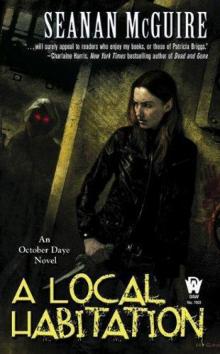 A Local Habitation
A Local Habitation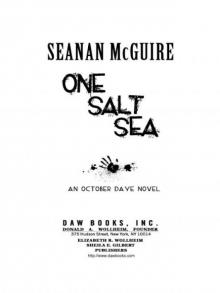 One Salt Sea
One Salt Sea Beneath the Sugar Sky
Beneath the Sugar Sky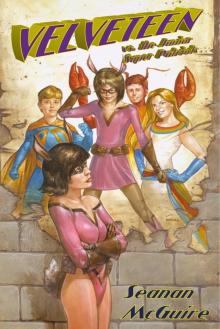 Velveteen vs. The Junior Super Patriots
Velveteen vs. The Junior Super Patriots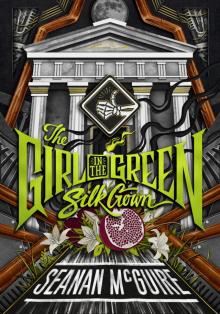 The Girl in the Green Silk Gown
The Girl in the Green Silk Gown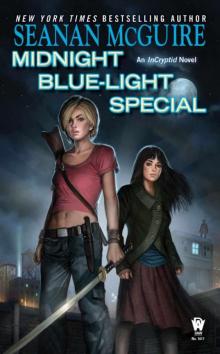 Midnight Blue-Light Special
Midnight Blue-Light Special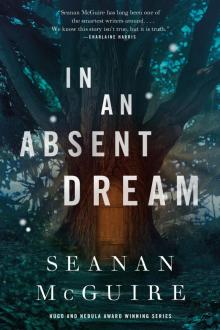 In an Absent Dream
In an Absent Dream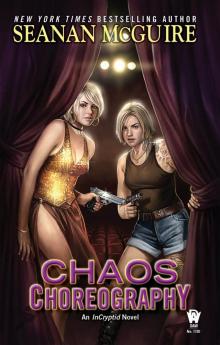 Chaos Choreography
Chaos Choreography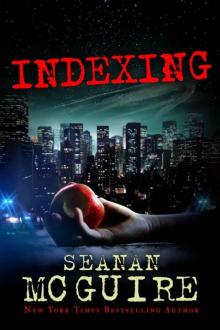 Indexing
Indexing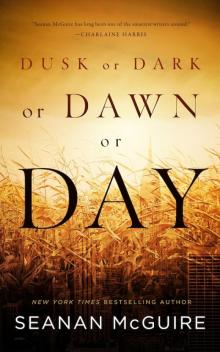 Dusk or Dark or Dawn or Day
Dusk or Dark or Dawn or Day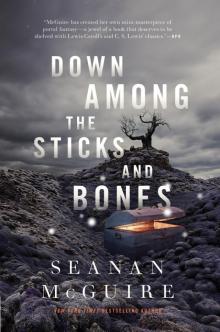 Down Among the Sticks and Bones
Down Among the Sticks and Bones The Razor's Edge
The Razor's Edge Midway Relics and Dying Breeds
Midway Relics and Dying Breeds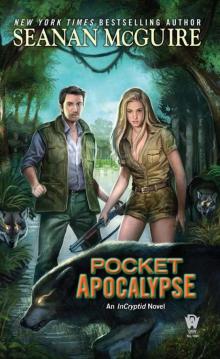 Pocket Apocalypse
Pocket Apocalypse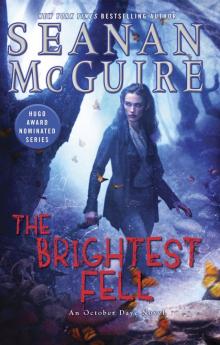 The Brightest Fell
The Brightest Fell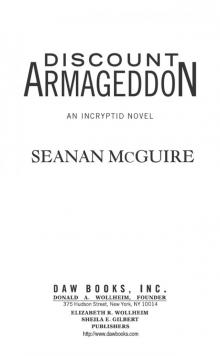 Discount Armageddon
Discount Armageddon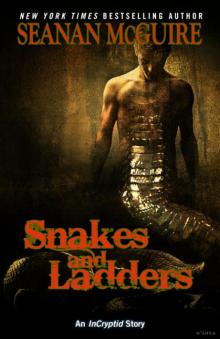 Snakes and Ladders
Snakes and Ladders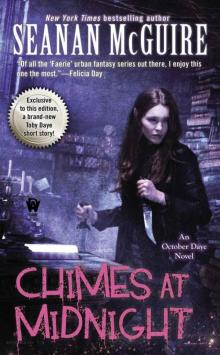 Chimes at Midnight
Chimes at Midnight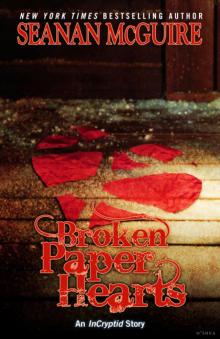 Broken Paper Hearts
Broken Paper Hearts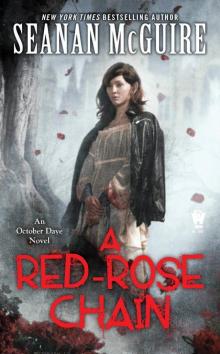 A Red-Rose Chain
A Red-Rose Chain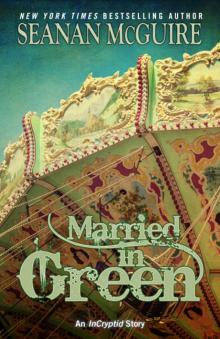 Married in Green
Married in Green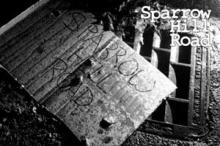 Sparrow Hill Road 2010 By Seanan
Sparrow Hill Road 2010 By Seanan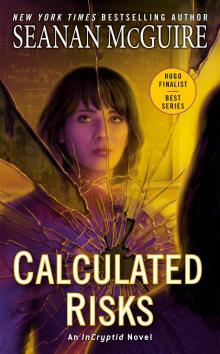 Calculated Risks
Calculated Risks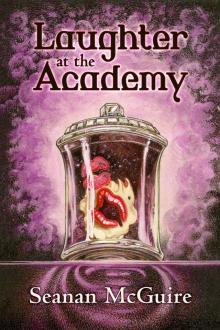 Laughter at the Academy
Laughter at the Academy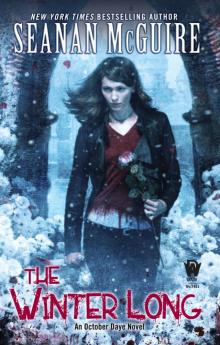 The Winter Long
The Winter Long We Both Go Down Together
We Both Go Down Together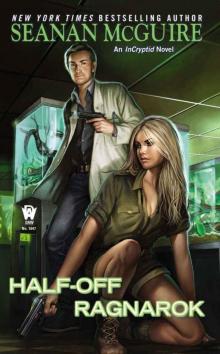 Half-Off Ragnarok
Half-Off Ragnarok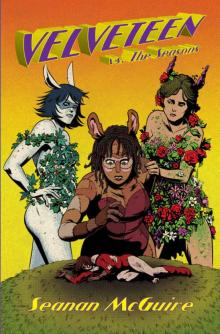 Velveteen vs. The Seasons
Velveteen vs. The Seasons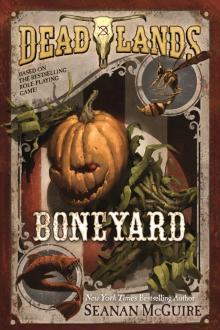 Boneyard
Boneyard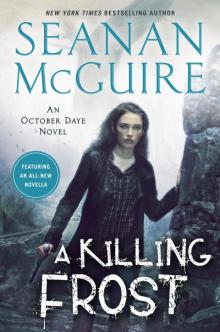 A Killing Frost
A Killing Frost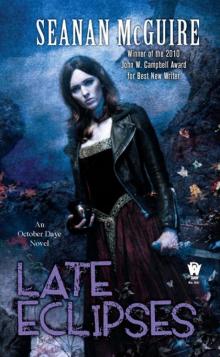 Late Eclipses
Late Eclipses Submerged
Submerged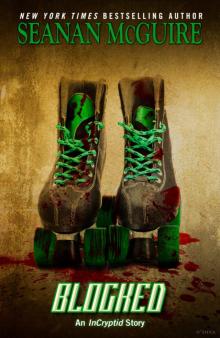 Blocked
Blocked Velveteen vs. The Multiverse
Velveteen vs. The Multiverse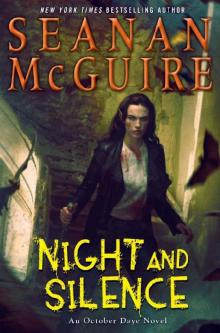 Night and Silence
Night and Silence The Unkindest Tide (October Daye)
The Unkindest Tide (October Daye)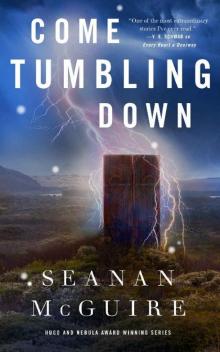 Come Tumbling Down (Wayward Children)
Come Tumbling Down (Wayward Children)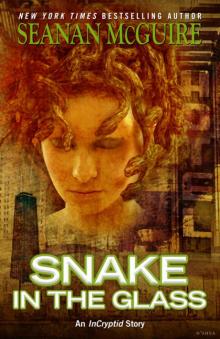 Snake in the Glass
Snake in the Glass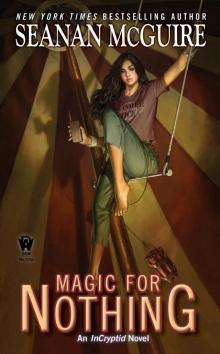 Magic for Nothing
Magic for Nothing Full of Briars
Full of Briars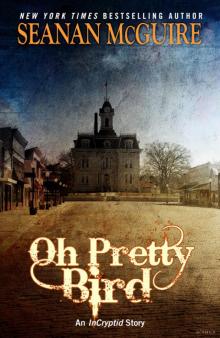 Oh Pretty Bird
Oh Pretty Bird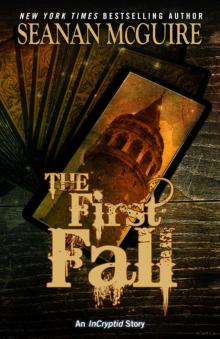 The First Fall
The First Fall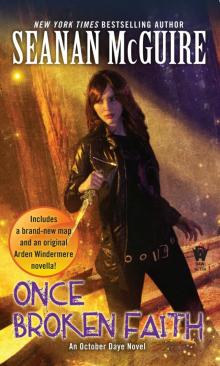 Once Broken Faith
Once Broken Faith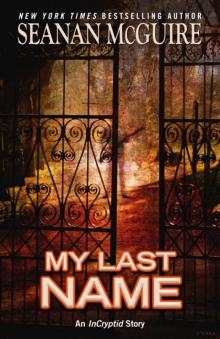 My Last Name
My Last Name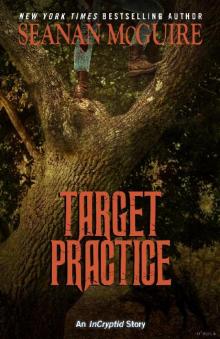 Target Practice
Target Practice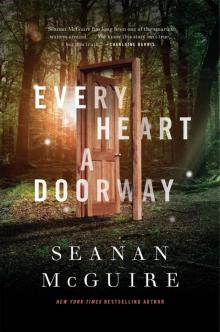 Wayward Children 01 - Every Heart a Doorway
Wayward Children 01 - Every Heart a Doorway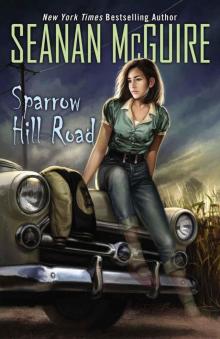 Sparrow Hill Road
Sparrow Hill Road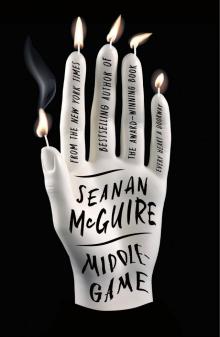 Middlegame
Middlegame Juice Like Wounds
Juice Like Wounds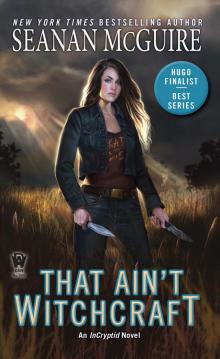 That Ain't Witchcraft
That Ain't Witchcraft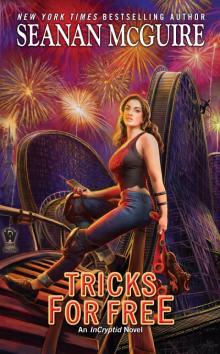 Tricks for Free
Tricks for Free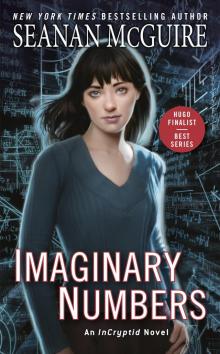 Imaginary Numbers
Imaginary Numbers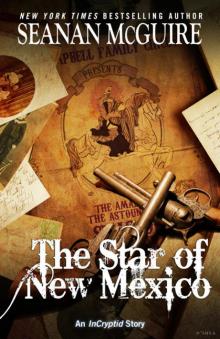 The Star of New Mexico
The Star of New Mexico Lay of the Land
Lay of the Land One Hell of a Ride
One Hell of a Ride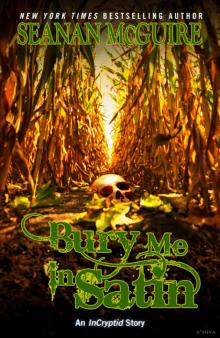 Bury Me in Satin
Bury Me in Satin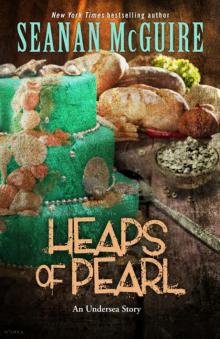 Heaps of Pearl
Heaps of Pearl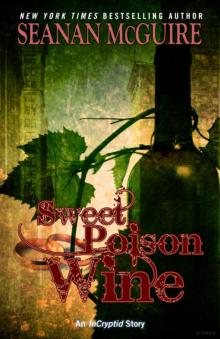 Sweet Poison Wine
Sweet Poison Wine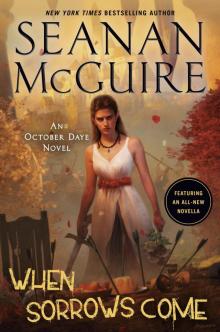 When Sorrows Come
When Sorrows Come Every Heart a Doorway
Every Heart a Doorway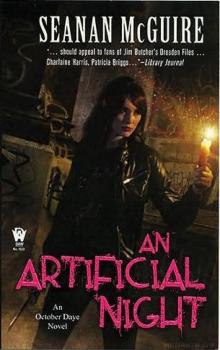 An Artificial Night - BK 3
An Artificial Night - BK 3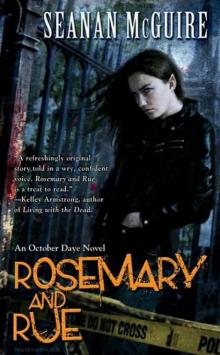 Rosemary and Rue
Rosemary and Rue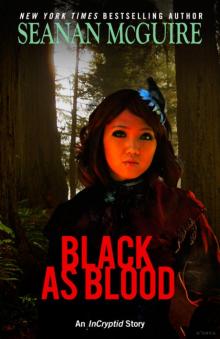 Black as Blood
Black as Blood Loch and Key
Loch and Key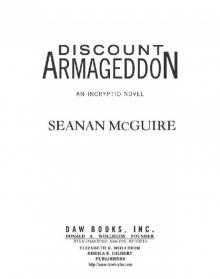 Discount Armageddon: An Incryptid Novel
Discount Armageddon: An Incryptid Novel The Unkindest Tide
The Unkindest Tide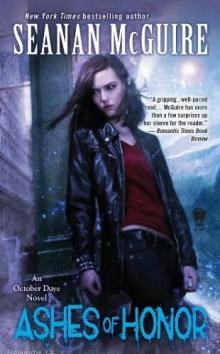 Ashes of Honor od-6
Ashes of Honor od-6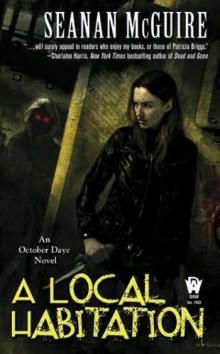 A Local Habitation od-2
A Local Habitation od-2 Waking Up in Vegas
Waking Up in Vegas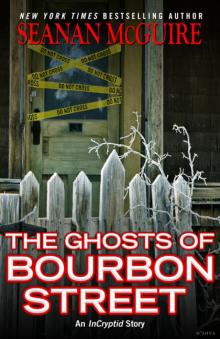 The Ghosts of Bourbon Street
The Ghosts of Bourbon Street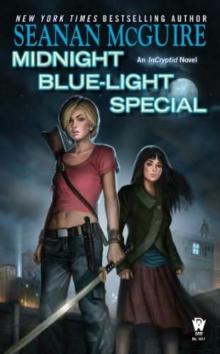 Midnight Blue-Light Special i-2
Midnight Blue-Light Special i-2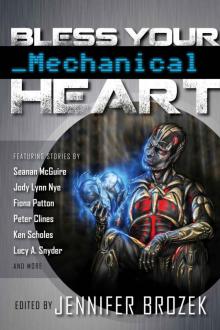 Bless Your Mechanical Heart
Bless Your Mechanical Heart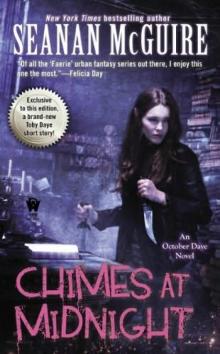 Chimes at Midnight od-7
Chimes at Midnight od-7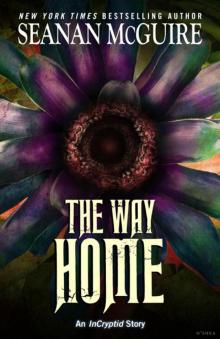 The Way Home
The Way Home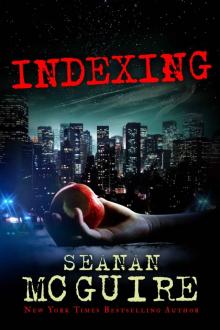 Indexing (Kindle Serial)
Indexing (Kindle Serial)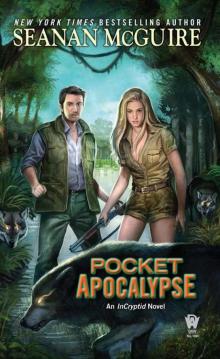 Pocket Apocalypse: InCryptid, Book Four
Pocket Apocalypse: InCryptid, Book Four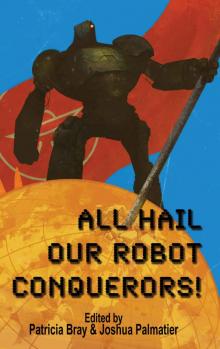 All Hail Our Robot Conquerors!
All Hail Our Robot Conquerors!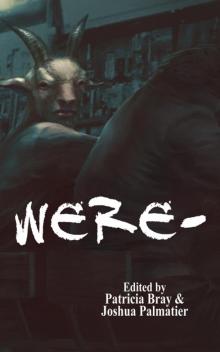 Were-
Were-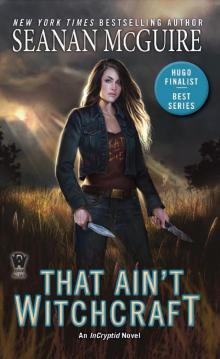 That Ain't Witchcraft (InCryptid #8)
That Ain't Witchcraft (InCryptid #8)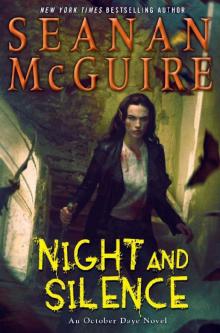 Night and Silence (October Daye)
Night and Silence (October Daye)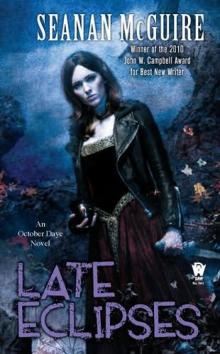 Late Eclipses od-4
Late Eclipses od-4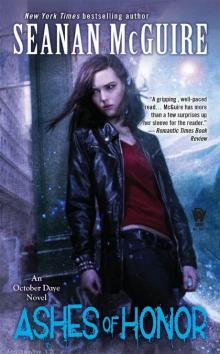 Ashes of Honor: An October Daye Novel
Ashes of Honor: An October Daye Novel Midway Relics and Dying Breeds: A Tor.Com Original
Midway Relics and Dying Breeds: A Tor.Com Original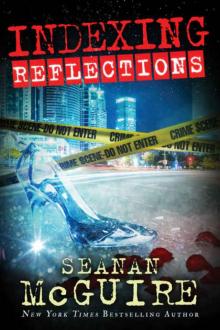 Indexing: Reflections (Kindle Serials) (Indexing Series Book 2)
Indexing: Reflections (Kindle Serials) (Indexing Series Book 2)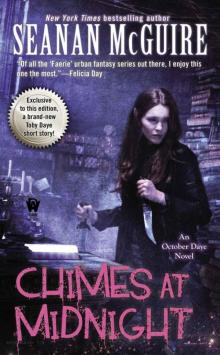 Chimes at Midnight: An October Daye Novel
Chimes at Midnight: An October Daye Novel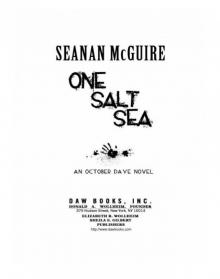 One Salt Sea: An October Daye Novel
One Salt Sea: An October Daye Novel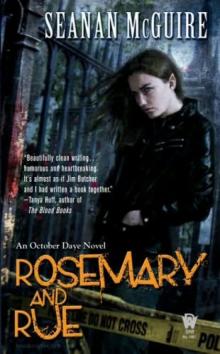 Rosemary and Rue od-1
Rosemary and Rue od-1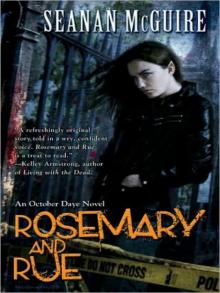 Rosemary and Rue: An October Daye Novel
Rosemary and Rue: An October Daye Novel Lightspeed Magazine Issue 49
Lightspeed Magazine Issue 49 Alien Artifacts
Alien Artifacts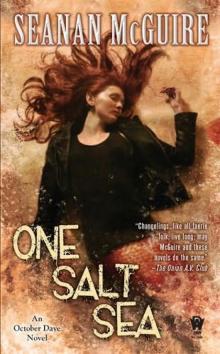 One Salt Sea od-5
One Salt Sea od-5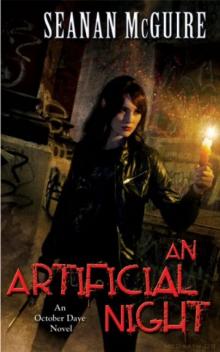 An Artificial Night od-3
An Artificial Night od-3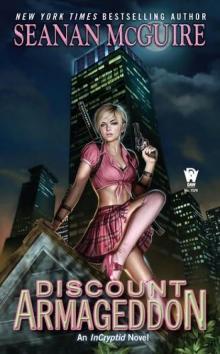 Discount Armageddon i-1
Discount Armageddon i-1